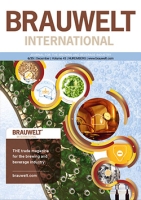The purpose of packaging for foodstuffs is on the one hand to protect the products from external impact, on the other hand it is supposed to prevent quality determining changes in-between production and consumption as far as possible. These goals are to be prioritised regardless of further requirements for the product, be it from the point of view of economy and ecology, logistics, marketing or availability of raw materials. This part of the article series on pasteurisation examines material and PET bottles production and also barrier coatings and closures.
In the first part of the article which appeared in Brauwelt International No. 4(2006), page 246, the author addressed the quality criteria applicable to design of cylindroconical tanks. This second part deals with dimensioning of cooling areas. The advantages and disadvantages of enclosing tanks are discussed – and sample calculations are provided.
Consumers expect a very high and constant quality level from food products, cosmetics and drugs. The industries achieve this objective through the use of high-quality raw materials, modern process engineering, careful preparation and strict compliance with hygiene standards.
Systems for production data acquisition have become an essential part of modern-day beverage bottling. The data from the inspection units are of particular significance in this context, since they directly supply information on the production output actually being achieved, enabling important line statistics to be compiled. The market already offers inspection and PDA systems compliant with standards for production data acquisition in the beverage industry.
At the beginning of May 2006, the new brewhouse of the Austrian Schwechat Brewery, Vienna was officially commissioned after a construction period of one year. Investments amounted to some 3 million Euro. In view of urban planning considerations, the brewery’s brewhouse had to be relocated to the headquarters. It was decided then and there to renew some major parts of the brewhouse to bring it up to current standards.
In Spring 2005 a Dutch brewer decided to invest in the upgrade of their existing two lauter tuns. The existing systems were equipped with two-zone ring type wort collection. It was the aim of this project to improve extract yield without slowing down process time. This article investigates the results and improvements of this upgrade.
Changeover of a control system always involves considerable risks for plant operators. It is only when compelling reasons exist that a decision is made in favour of a new system. Bavaria Brewery in Lieshout, Netherlands, decided to switch from Braumat PA 5700 to brewmaxx.
The multitude of bottle and crate types and the large number of widely differing beverage containers and secondary packaging in the beverage industry is steadily increasing worldwide. Hardly any company today is prepared to forgo an individual brand presentation both in the returnable and non-returnable sector. For the processing of
The authors simulated the actual processes of bottle washing and the friction effect caused by bottle transport on a laboratory scale. They compared the influences of various
Since the development of pure-bred yeast propagation by Hansen in 1881, the regular propagation of yeast has developed into a standard procedure, especially over the last few decades. There are many different designs of plant, but the single vessel process occupies a special position. This article reports on experience with a single vessel pure yeast propagation plant from GEA Diessel.
High increases | The Russian Efes succers story started in the early 90s. The high quality Efes Pilsener was exported into Russia, which made this country in an extremely very short time the most important export market for the Turkish brewery Group Efes. The logical decision was to invest in 1999, Efes Pilsener was one of the first beer brands to be brewed in Russia under licence. Today, the brewery group invests in modern packaging from KHS filling technology to meet the trend towards.


